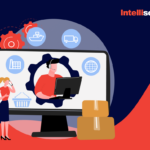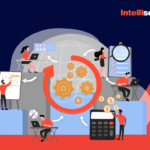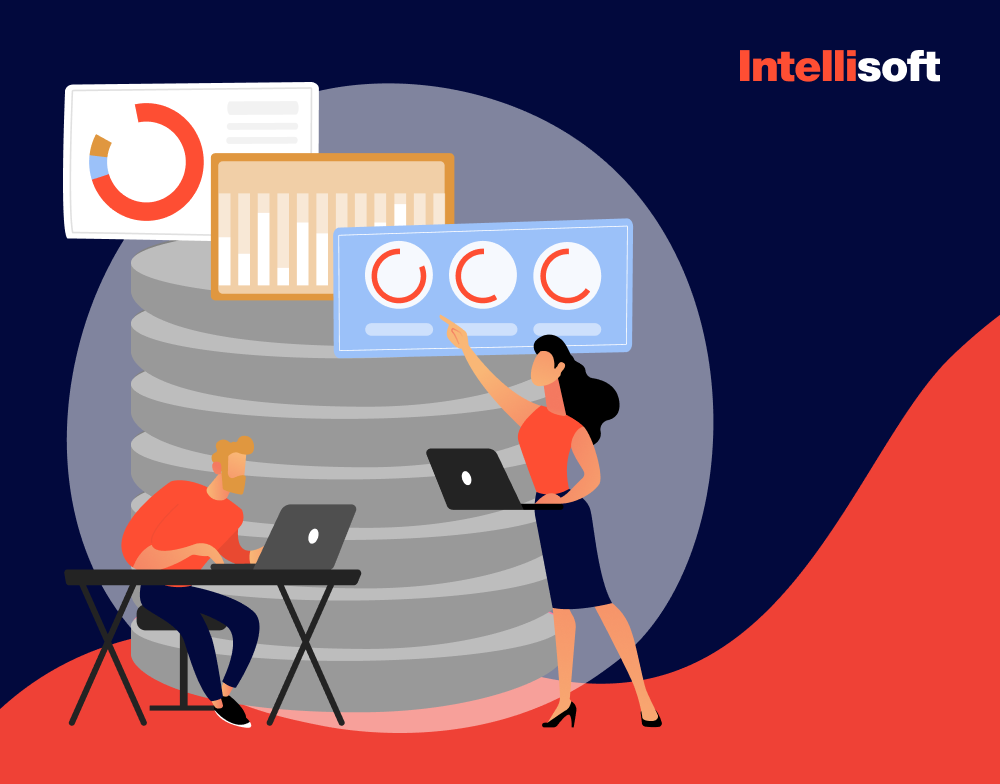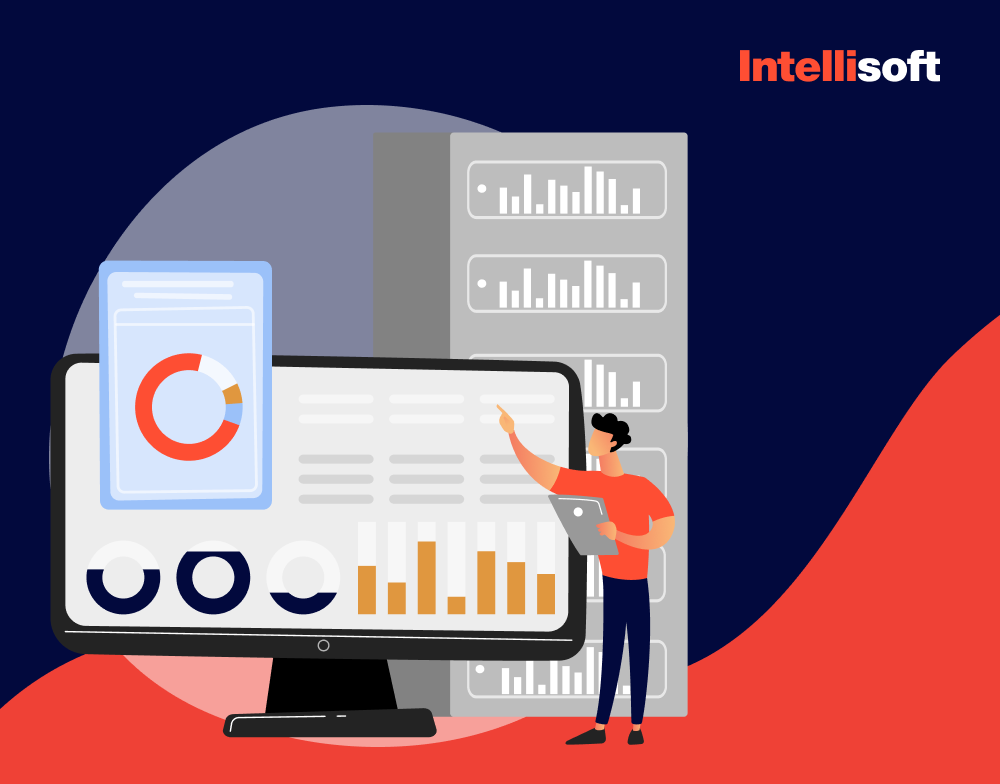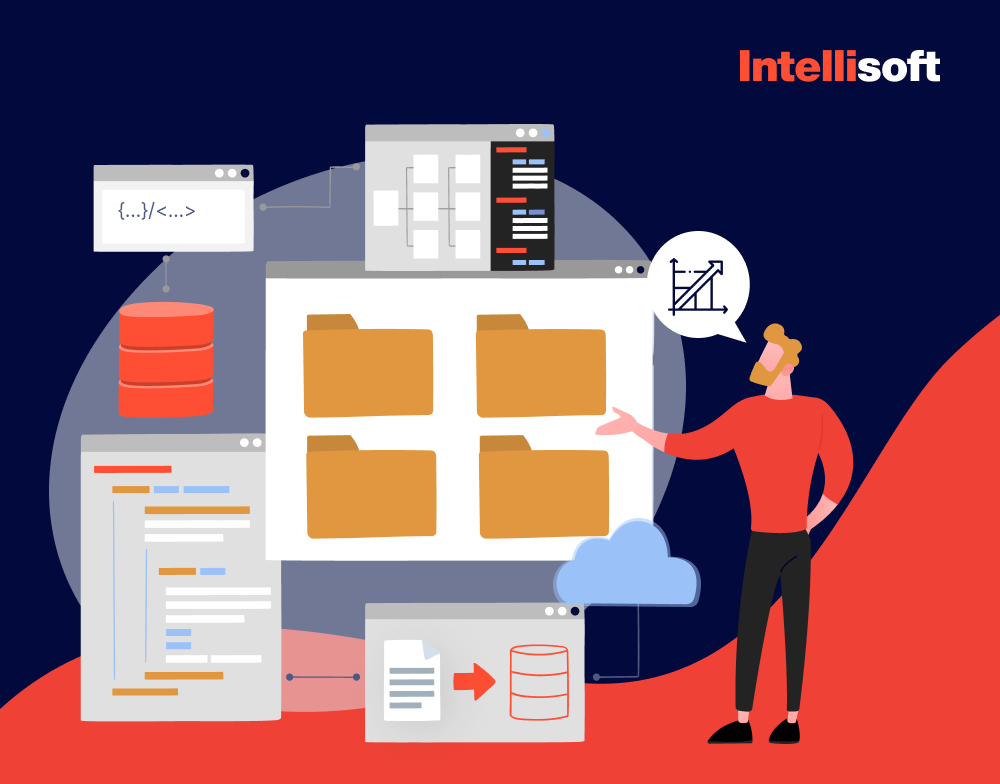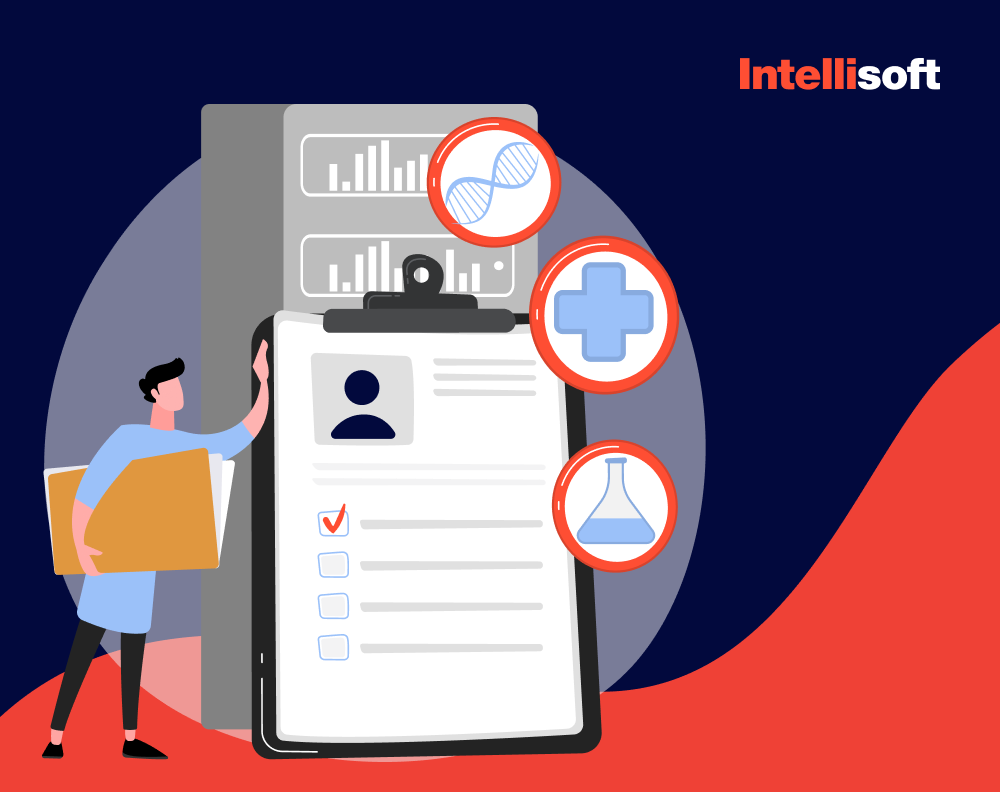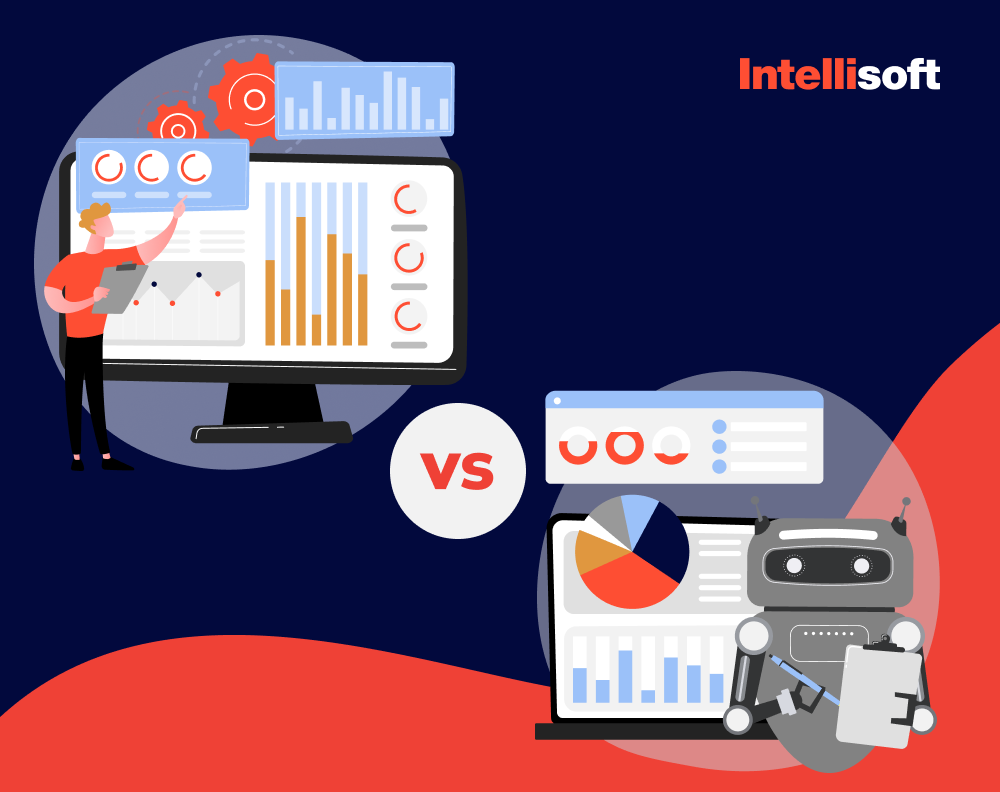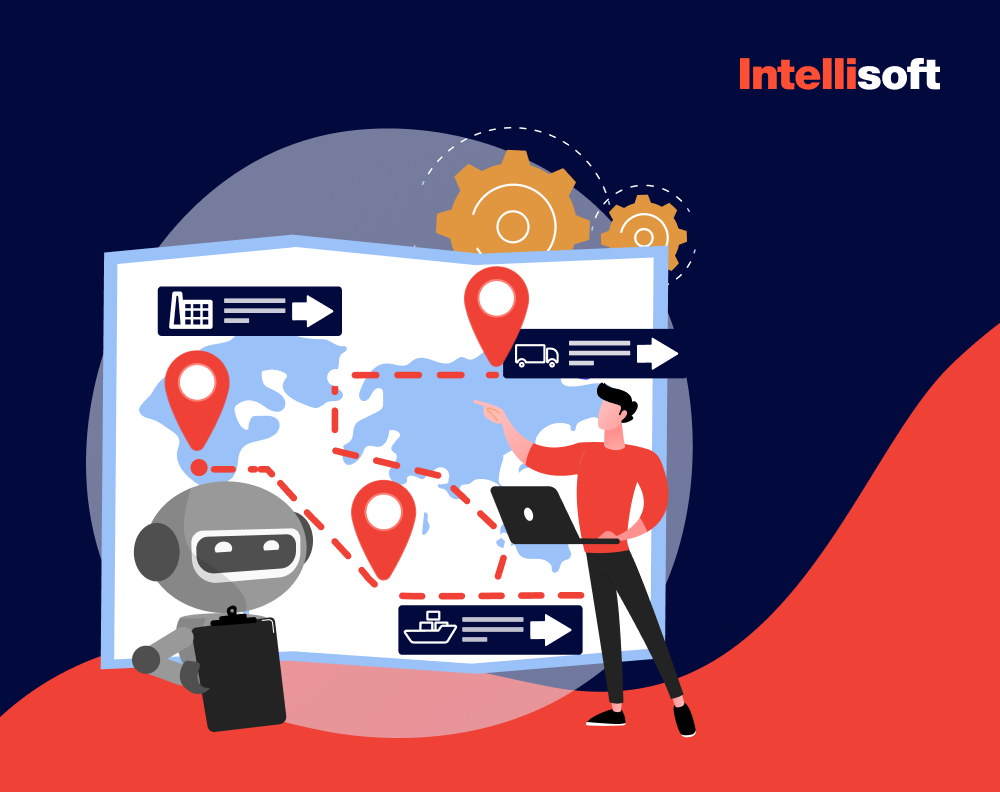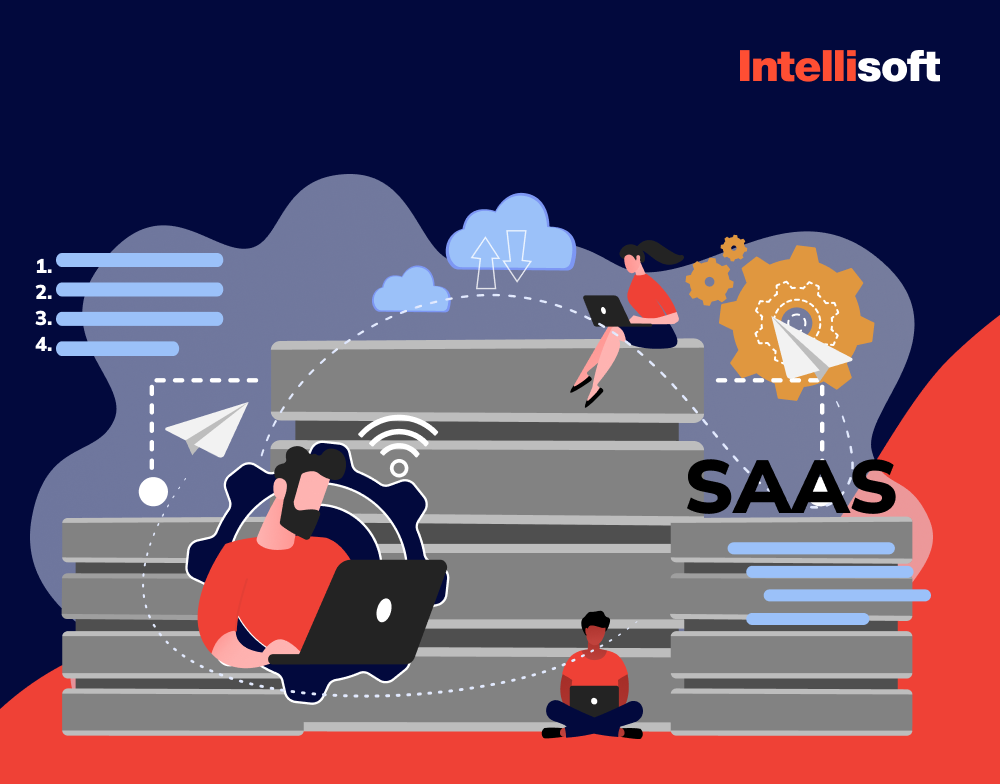The rapid development of the latest technologies changes the way people interact with businesses from various industries; nowadays, accessibility of information and services, instant support, and digitalization of documentation are essential for users. The healthcare industry is no exception – people expect to have access to convenient applications that allow them to e-check their data, latest statistics, analysis, and contact doctors from their homes.
The mHealth apps market size was valued at USD 56.26 billion in 2022, and the market is projected to reach USD 861.40 billion by 2030, recording a CAGR of 40.2% during the forecast period. These growing numbers mean one thing – the demand for digital healthcare solutions is increasing day by day. Thus, to be able to provide convenient and timely care to patients, enhance their engagement, and make more accurate and easier diagnoses, a healthcare app would be a must rather than an option.
If you have been looking for a way to improve your healthcare institution’s processes and provide better care for your patients, it’s time to develop a mobile application. Fortunately, you don’t have to do it all by yourself – IntelliSoft have created a healthcare application development guide to guide you through this process and share all the tips and tricks you need to know. Our 15 years of experience in the healthcare sector and mobile development ensure a seamless fusion of expertise and innovation. Building a healthcare app is not just about coding; it’s about crafting a transformative tool that streamlines processes, enhances patient engagement, and ultimately elevates the quality of care you deliver.
Table of Contents
What is Healthcare App Development?
Healthcare app development is the process of creating digital, mostly mobile, solutions for the healthcare sector. These applications rely on the use of advanced technologies that help enhance healthcare access, delivery, and management. As a result, they assist healthcare institutions in improving patient care and streamlining healthcare processes.
These applications serve as dynamic tools that bridge gaps in healthcare delivery, empowering both patients and healthcare providers. Through intuitive interfaces, real-time data access, and personalized features, these apps redefine the healthcare experience, making it more accessible, efficient, and patient-centric.
From telemedicine platforms enabling remote consultations to wellness trackers fostering proactive healthcare management, the scope of healthcare apps is expansive. They not only cater to immediate healthcare needs, but also contribute to preventive care, chronic disease management, and overall well-being.
Healthcare Mobile Application Development Guide: Types of Mobile Health Apps
Through the years of healthcare apps development, the industry has accumulated a huge number of various health application types. Each type is tailored to address the specific needs of the sector, improve patient outcomes, simplify the way of receiving care, and empower people to manage their well-being.
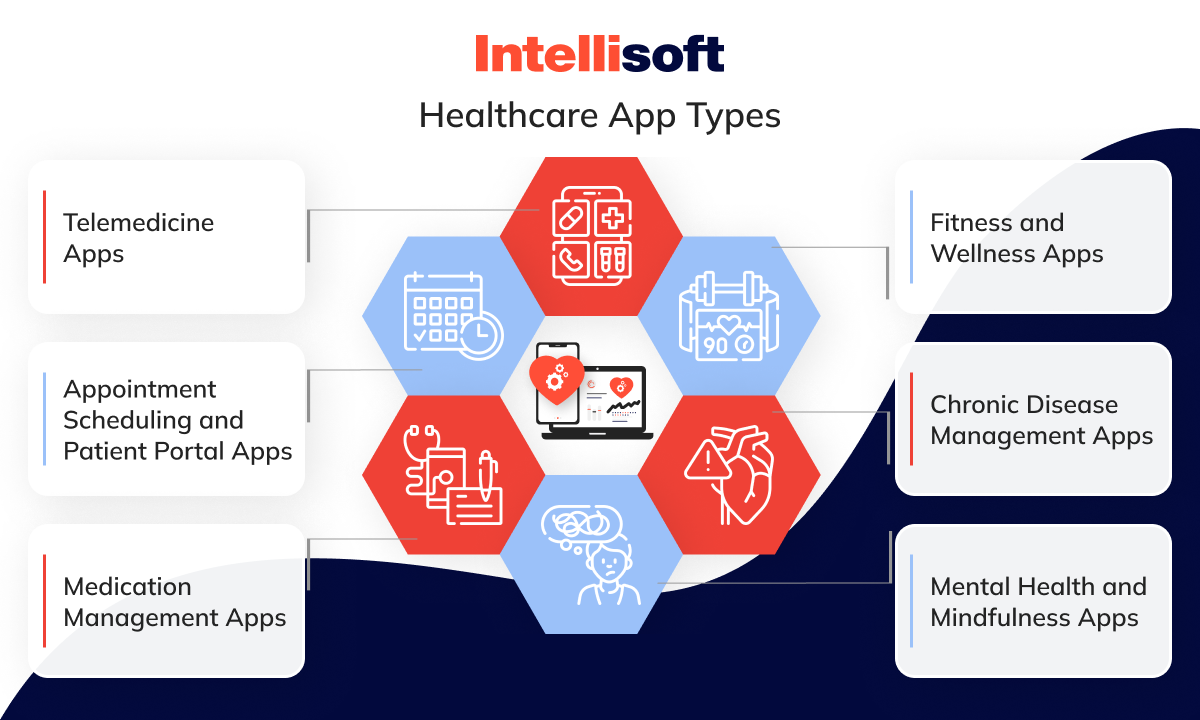
Let’s take a look at the main types of healthcare apps for patients and doctors:
Telemedicine Apps
Telemedicine apps revolutionize healthcare accessibility by enabling remote consultations between patients and healthcare providers. They leverage video conferencing, messaging, and image sharing to facilitate real-time communication, diagnosis, and treatment. These apps break down geographical barriers, ensuring that patients, regardless of location, can access timely medical advice. Especially beneficial for individuals in rural or underserved areas, telemedicine apps offer a lifeline for those with limited access to traditional healthcare facilities. Moreover, they minimize wait times, reduce travel costs, and enhance convenience for both patients and providers.
Appointment Scheduling and Patient Portal Apps
These apps streamline healthcare administrative processes, empowering patients with convenient tools to manage their healthcare journey. They enable patients to schedule appointments, access medical records, receive test results, and communicate with healthcare providers – all within a centralized platform. The patient portal functionality fosters a collaborative relationship between patients and their healthcare team, encouraging active participation in their care plans. What’s more, these apps reduce administrative burdens on healthcare staff by automating scheduling and information dissemination, ultimately improving operational efficiency.
Medication Management Apps
Medication management apps serve as personalized assistants, ensuring patients adhere to prescribed medication regimens. They provide features such as medication reminders, dosage instructions, pill identification, and refill notifications. By promoting adherence to medication schedules, these apps significantly reduce the risk of missed doses or incorrect usage, ultimately enhancing treatment efficacy and patient outcomes. They are particularly valuable for individuals managing multiple medications or complex dosing schedules.
Fitness and Wellness Apps
Dedicated to promoting holistic well-being, fitness and wellness apps offer a spectrum of tools and resources to support healthy lifestyles. They provide workout routines, nutrition tracking, sleep monitoring, and personalized health plans, empowering users to proactively manage their health. By encouraging physical activity, healthy eating habits, and stress reduction techniques, these apps contribute to preventive healthcare, aiming to reduce the risk of chronic conditions and improve overall health outcomes.
Chronic Disease Management Apps
Tailored for individuals coping with chronic conditions, these apps provide comprehensive support for managing long-term health challenges. They offer functionalities for symptom tracking, medication adherence, lifestyle modifications, and communication channels with healthcare providers. By empowering patients to actively monitor and manage their condition, these apps promote self-care, early intervention, and personalized treatment strategies, ultimately enhancing the quality of life for those with chronic illnesses.
Mental Health and Mindfulness Apps
Recognizing the significance of mental health, these apps offer a variety of resources to support emotional well-being. They feature meditation guides, stress-relief techniques, mood trackers, and access to therapy or counseling services. By providing tools for self-reflection, relaxation, and mental health support, these apps contribute to destigmatizing mental health issues and promoting overall emotional wellness.
Healthcare App Development vs Medical App Development
There are two terms that are often used interchangeably, even though they mean different types of apps: “healthcare app” and “medical app.” It is critical for practitioners, users, and app developers to understand these differences.
Health Apps
Health apps focus on promoting overall well-being and healthy lifestyles. They cater to the general public, offering a diverse range of services and guidance to enhance various aspects of health. These apps extend beyond medical diagnoses, emphasizing preventive care, fitness, mental well-being, and lifestyle management.
Key Characteristics:
- User Base: Geared towards people in general.
- Goal: Primarily designed to deliver health-related services, encourage healthy habits, and provide general health guidelines.
- Cost: Typically less expensive to develop.
Features:
- Fitness Tracking: Monitor and analyze physical activities, providing insights into exercise routines, steps taken, and calories burned.
- Wellness Programs: Offer personalized plans for mental health, stress reduction, and overall well-being.
- Nutrition Guidance: Provide dietary recommendations, meal tracking, and nutritional information to support healthy eating habits.
- Sleep Monitoring: Track sleep patterns and offer insights to improve sleep quality.
- Mental Health Support: Include features like meditation guides, stress-relief exercises, and mood tracking.
Use Case Example:
A comprehensive health app might combine features like fitness tracking, personalized wellness programs, nutrition guidance, and mental health support to offer a holistic approach to well-being.
Medical Apps
Medical apps are specialized tools designed for healthcare professionals and patients dealing with specific medical conditions. Medical app development involves in-depth functionalities, often incorporating data analysis for diagnosing health issues, managing electronic health records, and delivering precise medical information.
Key Characteristics of Medical App Development:
- User Base: Tailored for both healthcare professionals and patients in a medical context.
- Goal: Primarily used for diagnosing health issues, electronic health record management, and delivering medical information.
- Cost: Typically involves higher healthcare application development and maintenance costs due to specialized features and regulatory considerations.
Features:
- Electronic Health Records (EHR): Enable secure storage and management of patient health records for healthcare professionals.
- E-Prescription: Facilitate the electronic prescribing of medications, enhancing accuracy and efficiency.
- Data Analysis for Diagnosis: Utilize advanced algorithms to analyze health data for diagnostic purposes.
- Medical Information Repository: Provide a comprehensive database of medical information for reference and education.
- Telemedicine Integration: Incorporate functionalities for remote consultations between healthcare professionals and patients.
Use Case Example:
A medical app with EHR capabilities, e-prescription functionality, data analysis tools for diagnosis, and integrated telemedicine features can enhance the efficiency of healthcare delivery.
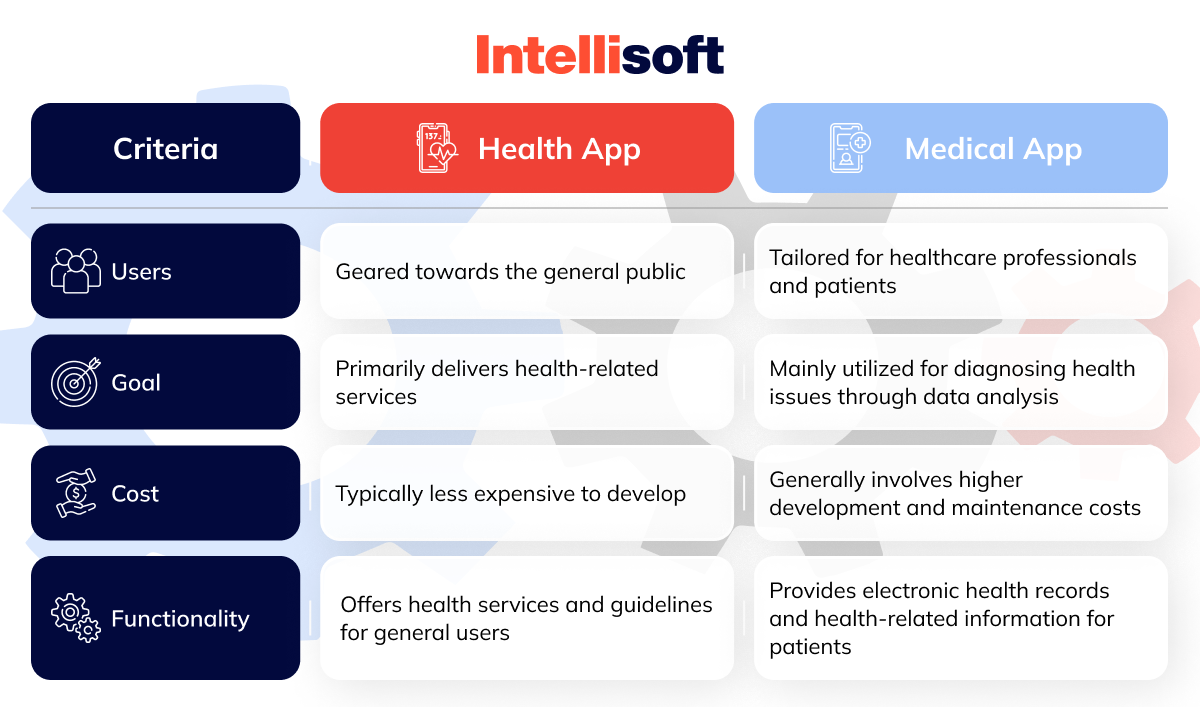
Must-Have Features in Your Healthcare App
The set of features in your healthcare app depends on your specific case and what type of issues you want to address. However, there’s a list of must-have features that every healthcare app should have, regardless of its type. Let’s explore what functionalities you should include in an MVP:
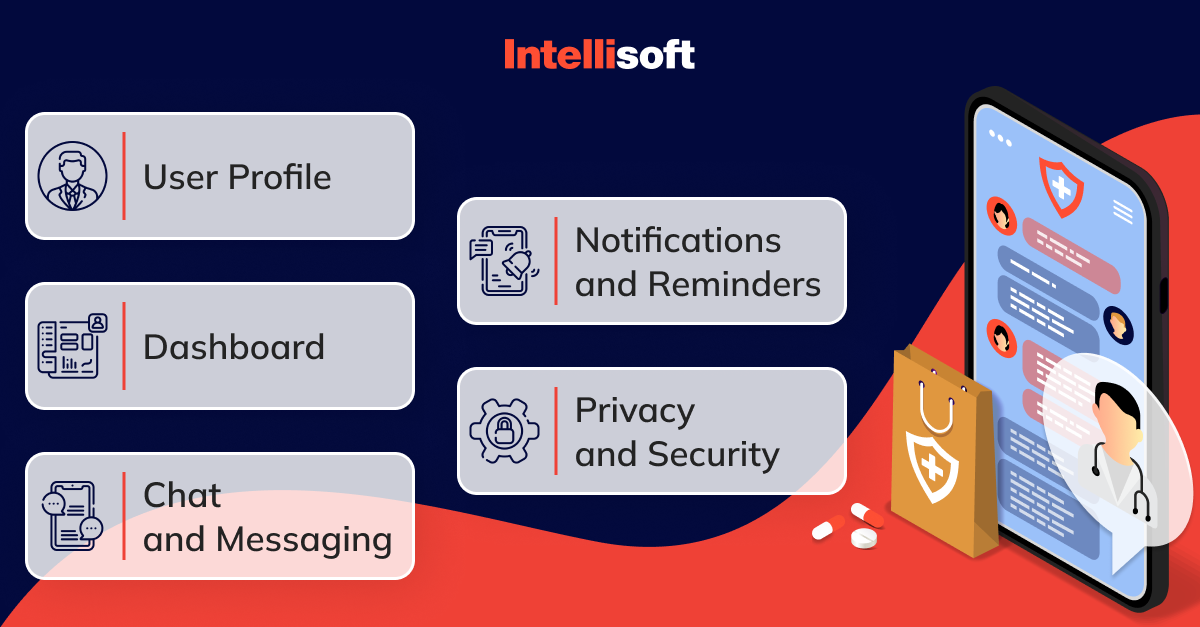
User Profile
Any healthcare app should allow users to sign up/login using their personal information and have access to their user profile. Thus, make sure to simplify the logging-in process to grant users quick access to the app.
Moreover, the user profile should include essential information about the person; their name, age, height, weight, health issues, fitness goals, and so on. Users should be able to update their information, control what data the app can access, etc.
Dashboard
Next, focus on creating a user-friendly, visually appealing dashboard. It should provide a comprehensive overview of the user’s health and fitness data, including progress toward their goals, recent activities, and any important alerts. The dashboard should be customizable, allowing users to prioritize and organize information based on their preferences.
Chat and Messaging
Oftentimes, healthcare apps are used for communication between patients and doctors. This is the case for telehealth apps, so if you’re developing one, remember to add a chat and messaging option. This way, patients will be able to communicate with the doctors, reread the messages to find necessary information, and have access to care from anywhere.
In non-telehealth apps, incorporating chat options can create a supportive community where users with similar health interests can interact and motivate each other to achieve their wellness goals.
Notifications and Reminders
Notifications and reminders are also essential for healthcare apps as they will remind users about their doctor appointments, time to take medications or do yoga/workouts, drink water, or go for a walk. This way, users will be conscious of their wellness habits and health and continue to use your app.
Privacy and Security
Healthcare apps deal with sensitive user data, making robust privacy and security measures imperative. Ensure end-to-end encryption for user data, comply with healthcare data protection regulations, and incorporate authentication protocols. Users must have confidence that their personal health information is secure, fostering trust and encouraging long-term app usage.
Related readings:
- Automation in the Industry of Healthcare: Main Benefits for Business
- Predictive Analytics in Healthcare: How To Implement In Your Organization
- Hospital App Development: Innovate, Integrate, and Provide Better Care
- What Technologies Are Driving the Health Protection System?
- Technological Trends in Healthcare in 2023
How to Develop a Healthcare App: Step-by-Step Guide
This is a detailed healthcare application development guide, covering the entire process from idea validation to post-deployment maintenance.
Here is how to develop a healthcare app:
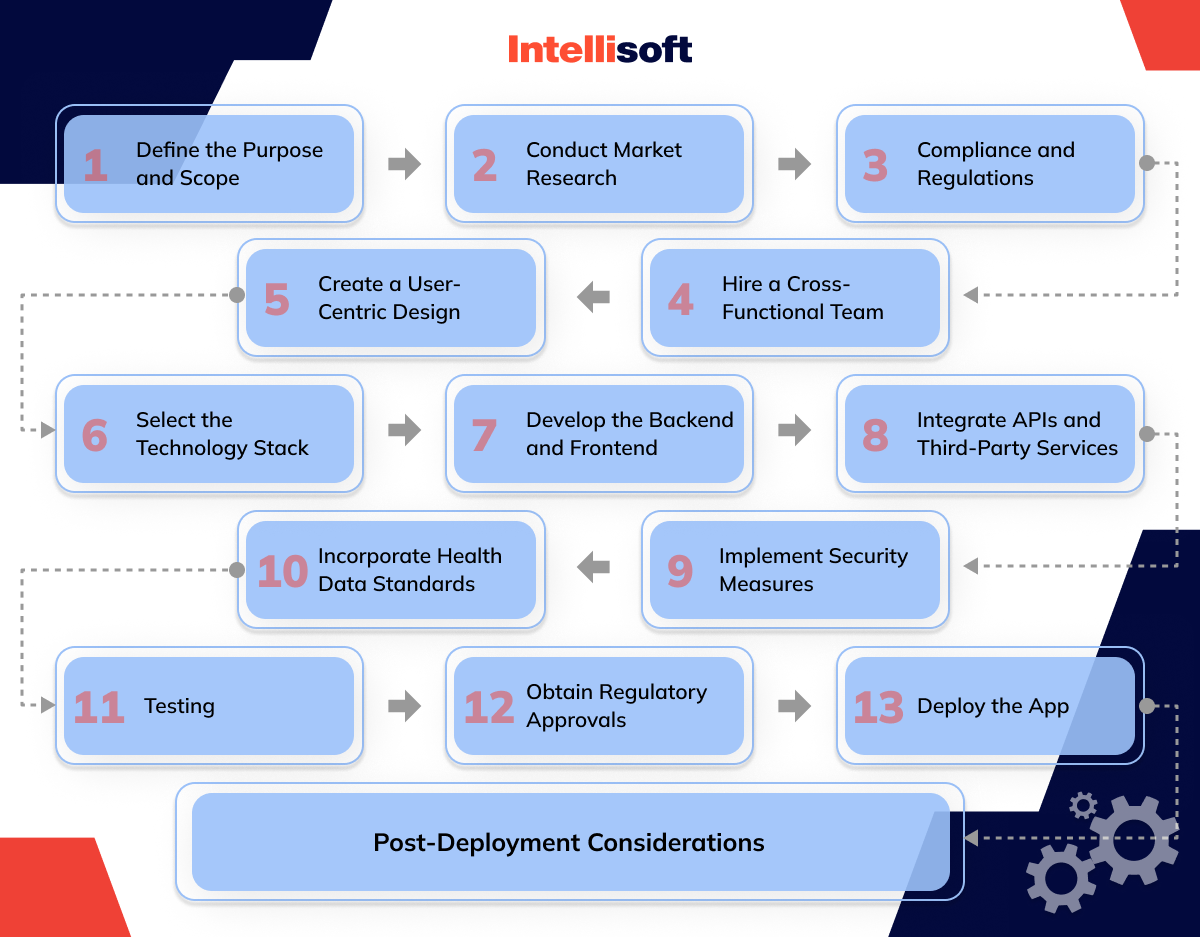
Step 1. Define the Purpose and Scope
First, you need to come up with an idea. What do you want to create, what issues it will solve, and how? Think of who the target audience is and what they would like to see in an app.
Once you have crystallized your concept, sketch out the scope of your app. It should include the functionalities and ensure that they align with the issues and their solutions. This foundational step lays the basis for the next stages of healthcare application development, setting the direction for a purposeful and effective healthcare app.
Step 2. Conduct Market Research
Once the main purpose of your app is clear, it’s time to embark on a journey of comprehensive market research. Analyze the current landscape of healthcare apps and identify your main competitors. Read user reviews and list the strengths and weaknesses of similar apps.
Gathering all this data together with user preferences will help you create an app that is distinct from other apps, meet user demands, and avoid your competitors’ mistakes. Market research lays the foundation for a strategic and informed healthcare apps development process, enhancing the chances of your healthcare app’s success.
Step 3. Compliance and Regulations
Get familiar with the main healthcare regulations, especially if the app will handle sensitive data. Ensure your app adheres to data protection laws, such as HIPAA in the United States and any other relevant regulations.
You can collaborate with legal experts to establish a robust framework that safeguards user data privacy and security. Addressing compliance early in the custom healthcare apps development process is essential to mitigate risks and build trust with users.
Step 4. Hire a Cross-functional Team
Form a dedicated team comprising professionals with specialized knowledge in healthcare, software development, design, quality assurance, and compliance. It is crucial that your team possesses a deep understanding of the distinctive challenges and specific requirements associated with custom healthcare apps development.
There are three main types of healthcare mobile app development services you hire for creating a mobile healthcare app:
- Hire an in-house team: Bring together a team of professionals to work within your organization. This approach allows for direct collaboration and control over the development process.
- Hire freelancers: Engage independent professionals with the required skills on a project basis. This flexible option can be cost-effective, especially for specific tasks or short-term projects.
- Outsource: Delegate the development process to external agencies or teams. Outsourcing can provide access to specialized skills and reduce operational costs, but effective communication and project management are crucial for success.
Step 5. Create a User-Centric Design
Focus on creating a user-friendly design that caters to the needs and preferences of your target audience. The interface should be intuitive, visually appealing, easy to navigate, and foster a positive interaction between users and he app.
Step 6. Select the Technology Stack
Select a robust technology stack that aligns with the requirements of your healthcare app. Consider factors such as scalability, security, and compatibility to build a reliable foundation for both the back-end and front-end medical app development.
Step 7. Develop the Backend and Frontend
Execute the healthcare mobile app development of the backend and frontend components of your healthcare app. Build a seamless and efficient backend infrastructure that handles data securely while crafting a responsive and user-friendly frontend for an optimal user experience.
Step 8. Integrate APIs and Third-Party Services
Enhance the functionality of your healthcare app by integrating relevant APIs and third-party services. This step allows you to leverage external capabilities, such as healthcare databases or analytics tools, to augment the overall performance and utility of your application.
Examples include healthcare databases for comprehensive medical information, analytics tools for data-driven insights, appointment scheduling services for user convenience, telemedicine platforms for virtual consultations, and wearable device integration for seamless health monitoring.
Step 9. Implement Security Measures
Prioritize the security of user data by implementing robust measures throughout the development process. Incorporate encryption, authentication protocols, and compliance with data protection regulations to safeguard sensitive health information and instill trust in your users.
Step 10. Incorporate Health Data Standards
Ensure that your healthcare app adheres to established health data standards. This involves using standardized formats and protocols for storing and exchanging health-related information. Adherence to standards such as HL7 (Health Level Seven) and FHIR (Fast Healthcare Interoperability Resources) promotes interoperability and seamless integration with existing healthcare systems.
Step 11. Testing
Thoroughly test your app to ensure functionality, usability, security, and compliance with healthcare regulations. Different types of testing — unit testing, integration testing, security testing, usability testing, and more — are crucial to identify and rectify any issues before launching the app.
Step 12. Obtain Regulatory Approvals
If your healthcare app handles sensitive data or provides medical services, obtaining necessary regulatory approvals is crucial. This could involve certifications or clearances from relevant authorities to ensure compliance with healthcare laws and regulations.
Step 13. Deploy the App
Deploy your healthcare app on the chosen platforms, such as the App Store, Google Play, or specific enterprise platforms. Monitor the deployment process closely to ensure a smooth launch.
Post-Deployment Considerations
The next step of the healthcare mobile application development guide is post-deployment processes:
- User Feedback and Iteration: After launch, actively seek and incorporate user feedback to improve the app’s functionalities and user experience and address any issues that arise.
- Regular Updates and Maintenance: Regularly update the app to fix bugs, add new features, and ensure compatibility with evolving technologies and regulations.
- Analytics and Data Monitoring: Implement analytics tools to gather insights on user behavior, app performance, and usage patterns. This data can guide future enhancements and updates.
- Customer Support and Engagement: Provide robust customer support to promptly address user queries or issues. Engaging users through newsletters, updates, or additional features can maintain user interest and loyalty.
- Security Updates: Continuously monitor and update security measures to protect user data from evolving threats and vulnerabilities.
- Scaling and Growth Strategy: Plan for scalability to accommodate an increasing user base. Strategize for future expansions, partnerships, or integrations that align with the app’s growth trajectory.
- Compliance Maintenance: Regularly audit and ensure ongoing compliance with healthcare regulations and data protection standards as they evolve.
Healthcare App Development Technology Stack
A healthcare app development guide also includes main technology used in the telehealth app development process. Crafting a successful healthcare app requires a meticulously chosen technology stack. From frontend and backend development to security measures, cloud services, mobile app tools, and DevOps practices, each component plays an important role in creating a robust and secure application. Let’s explore the essential technologies integral to building a cutting-edge healthcare app.
Frontend Development
- Programming Languages: HTML5, CSS3, JavaScript
- Frameworks: React.js, Angular, Vue.js
- Mobile App Development: React Native (for cross-platform), Swift (for iOS), Kotlin or Java (for Android)
Backend Development
- Programming Languages: Python, Ruby, Java, Node.js, .NET
- Frameworks: Django (Python), Ruby on Rails (Ruby), Spring Boot (Java), Express.js (Node.js)
Database Management
- Relational Databases: MySQL, PostgreSQL
- NoSQL Databases: MongoDB, CouchDB
- In-memory Databases (for real-time data): Redis
Server
- Web Server: Nginx, Apache
- Application Server: Gunicorn, uWSGI
APIs and Integrations
- RESTful APIs: For communication between the frontend and backend
- HL7 (Health Level Seven): Standard for exchanging healthcare information
- FHIR (Fast Healthcare Interoperability Resources): Standard for healthcare data exchange
Cloud Services
- Platform as a Service (PaaS): AWS, Google Cloud Platform, Microsoft Azure
- Database as a Service (DBaaS): Amazon RDS, Azure Database, Google Cloud Firestore
Security
- Data Encryption: SSL/TLS
- Authentication and Authorization: OAuth, JWT
- Compliance with Healthcare Regulations: HIPAA, GDPR
Mobile App Development Tools
- Integrated Development Environment (IDE): Xcode (for iOS), Android Studio (for Android)
- Cross-Platform Development: React Native, Xamarin, Flutter
Testing
- Unit Testing: Jest, JUnit
- Integration Testing: Postman, Newman
- Security Testing: OWASP ZAP, Nessus
DevOps
- Version Control: Git
- Continuous Integration/Continuous Deployment (CI/CD): Jenkins, Travis CI
- Containerization: Docker
- Orchestration: Kubernetes
Monitoring and Analytics
- Monitoring Tools: Prometheus, Grafana
- Error Tracking: Sentry, New Relic
- Analytics: Google Analytics, Mixpanel
How Much Does It Cost to Develop a Healthcare App?
The next part of our healthcare app development guide covers the development costs. The cost of developing a healthcare app can vary widely based on several factors, including the complexity of the app, features, platform (iOS, Android, or both), development team location, and regulatory compliance requirements. Here are some key factors that can influence the cost:
Scope and Complexity
- Basic healthcare apps with simple features like appointment scheduling may cost less.
- More complex apps with features such as telemedicine, electronic health records (EHR), integration with wearables, and AI-driven functionalities will be more expensive.
Platform
- Developing for both iOS and Android platforms will typically cost more than choosing one platform initially.
- Native app development is generally more expensive than cross-platform telehealth app development.
Design and User Experience
- A well-designed and user-friendly app may require more investment in terms of design and user experience (UX) design.
Regulatory Compliance
- Healthcare apps often need to comply with strict regulations, such as HIPAA in the United States or GDPR in Europe. Ensuring compliance can increase development costs.
Integration with Existing Systems
- If the app needs to integrate with existing healthcare systems, electronic health records (EHR), or third-party services, it can add to the complexity and cost.
Security
- Healthcare apps deal with sensitive patient information, so robust security measures are crucial. Implementing high-level security features can increase telehealth app development costs.
Testing and Quality Assurance
- Healthcare apps require thorough testing to ensure they meet regulatory standards and are free of bugs. Quality assurance processes contribute to the overall cost.
Maintenance and Updates
- Ongoing maintenance, updates, and support after the app’s launch are additional costs that should be considered.
Geographical Location of the Development Team
- The hourly rates of healthcare mobile app development teams vary based on their location. Development teams in North America or Europe, for example, may have higher rates compared to teams in Asia or Eastern Europe.
Providing a ballpark figure, a simple healthcare app with fundamental features might initiate at approximately $20,000 to $50,000. Conversely, for more intricate apps featuring advanced functionalities, integrations, and heightened customization, the cost could extend from $50,000 to $150,000 or beyond.
Healthcare App Development Team Composition
The development of a healthcare app requires a diverse team with specific roles and expertise. Here’s a breakdown of the typical healthcare app development team composition:
- Front End Developer: Responsible for designing and implementing the user interface (UI) of the healthcare app. They focus on creating a visually appealing and user-friendly interface.
- Back End Developer: Manages server-side development, handling the logic, database interactions, and server operations that enable the functionality of the healthcare app.
- DevOps: Ensures smooth collaboration between development and operations teams. DevOps professionals handle deployment, automation, and infrastructure management tasks to enhance the development process.
- Business Analyst: Analyzes and documents the project requirements, ensuring that the healthcare app aligns with the business goals and user needs. The business analyst acts as a bridge between the development team and stakeholders.
- Compliance Expert: Focuses on ensuring that the healthcare app complies with relevant regulations, such as HIPAA in the United States. This role is crucial for maintaining the security and privacy of patient data.
- UI/UX Expert: Specializes in creating an optimal user experience (UX) and user interface (UI) design. They consider usability, accessibility, and overall user satisfaction.
- Project Manager: Oversees the entire development process, coordinating tasks, managing resources, and ensuring that the project is delivered on time and within budget. The project manager also communicates with stakeholders and keeps the team on track.
- Quality Assurance: Conducts thorough testing of the healthcare app to identify and address any bugs, issues, or potential improvements. QA specialists play a critical role in ensuring the app’s reliability and performance.
This team composition provides a well-rounded set of skills and expertise necessary for the successful telehealth app development. Depending on the project’s complexity, additional roles or specialization may be required, such as security experts for ensuring data protection or data scientists for implementing advanced analytics features.
What is Healthcare App Development Timeframe?
There’s no universal mobile healthcare app development time; the more complex the app – the longer the process will take, and vice versa. Moreover, the time depends on the features you want to add, the development team, etc. Let’s assess the timeframes for the development of various healthcare apps based on their complexity.
Simple Mobile Healthcare App Development
A simple healthcare app focusing on fundamental features like appointment scheduling, medication reminders, and basic health information typically requires a development time of 3 to 6 months. This assumes a streamlined medical mobile app development process with a smaller to medium-sized development team. The simplicity of features allows for a more straightforward implementation and testing phase.
Average Mobile Healthcare App Development
For a more comprehensive healthcare app incorporating features such as electronic health records (EHR) integration, telemedicine capabilities, and secure messaging, the medical mobile app development timeline expands to 6 to 12 months. The increased complexity requires a more thorough testing process, integration with external systems, and adherence to healthcare regulations, adding to the overall medical mobile app development time.
Complex Healthcare App Development
Highly complex healthcare apps with advanced functionalities like machine learning algorithms for diagnostics, real-time monitoring, integration with multiple healthcare systems, and strict compliance with healthcare standards such as HIPAA may take over a year to develop. The timeline for these intricate projects can extend to 18 months or more, requiring a larger development team with specialized skills. Rigorous testing and multiple iterations are essential to ensure the app’s reliability and security.
In addition to complexity, factors such as regulatory approval processes, data security measures, and user experience optimization play important roles in determining the overall development timeline. Engaging with a development team experienced in healthcare app development, and maintaining clear communication throughout the project, can contribute to effective project management and timely delivery. Furthermore, staying updated on evolving healthcare regulations is crucial to address compliance requirements and potential modifications during the development process.
How Can IntelliSoft Help You with Healthcare App Development?
In the rapidly evolving landscape of healthcare, partnering with IntelliSoft for cutting-edge healthcare software development services proves to be a transformative choice. With over a decade of proven expertise, IntelliSoft stands as a reliable ally for medical businesses, facilities, and startups seeking secure and compliant solutions.
Our commitment to excellence is reflected in the profound benefits we bring, from streamlined communication between medical departments to the assurance of improved medical treatment outcomes and robust security measures for sensitive patient data.
IntelliSoft’s flexible working models, be it project-based collaboration, team extension, or SLA-based services, demonstrate our dedication to meeting diverse client needs. The healthcare software development services offered cover a broad spectrum, including custom medical software development, healthcare integration, web and mobile portals, SaaS solutions, AI and machine learning implementations, wearable device software, and dedicated development centers.
The emphasis on data security, continuous tech support, and adherence to regulatory standards positions IntelliSoft as a comprehensive solution provider in the healthcare software development realm.
As you embark on your healthcare software development journey, IntelliSoft stands ready to be your strategic partner, offering transformative solutions that elevate the efficiency and quality of healthcare delivery.
Contact us, and let’s transform your healthcare institution into an innovative center of excellence.
